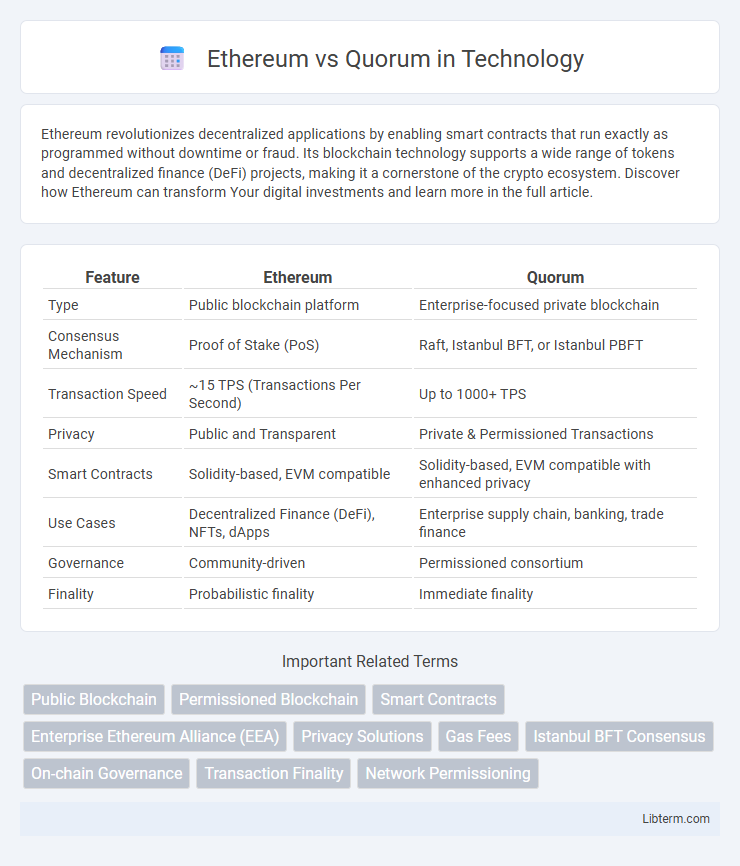Ethereum revolutionizes decentralized applications by enabling smart contracts that run exactly as programmed without downtime or fraud. Its blockchain technology supports a wide range of tokens and decentralized finance (DeFi) projects, making it a cornerstone of the crypto ecosystem. Discover how Ethereum can transform Your digital investments and learn more in the full article.
Table of Comparison
| Feature | Ethereum | Quorum |
|---|---|---|
| Type | Public blockchain platform | Enterprise-focused private blockchain |
| Consensus Mechanism | Proof of Stake (PoS) | Raft, Istanbul BFT, or Istanbul PBFT |
| Transaction Speed | ~15 TPS (Transactions Per Second) | Up to 1000+ TPS |
| Privacy | Public and Transparent | Private & Permissioned Transactions |
| Smart Contracts | Solidity-based, EVM compatible | Solidity-based, EVM compatible with enhanced privacy |
| Use Cases | Decentralized Finance (DeFi), NFTs, dApps | Enterprise supply chain, banking, trade finance |
| Governance | Community-driven | Permissioned consortium |
| Finality | Probabilistic finality | Immediate finality |
Introduction to Ethereum and Quorum
Ethereum is a decentralized, open-source blockchain platform that supports smart contracts and enables the development of decentralized applications (dApps) on a public network. Quorum is an enterprise-focused version of Ethereum designed by JPMorgan, offering enhanced privacy, permissioned access, and high throughput for business use cases. While Ethereum operates on a public blockchain with transparency and broad participation, Quorum provides a permissioned environment tailored for private, consortium-based networks.
Core Architecture Comparison
Ethereum operates on a public blockchain with a decentralized consensus mechanism using Proof of Stake, enabling transparent, trustless transactions and smart contract execution. Quorum, built on Ethereum's protocol, is designed for enterprise use with a permissioned network that employs consensus algorithms like Raft or Istanbul BFT, emphasizing privacy and transaction speed. The core architectural difference lies in Ethereum's focus on public accessibility and decentralization, whereas Quorum prioritizes controlled participant access and enhanced privacy features within a private blockchain framework.
Consensus Mechanisms: Differences and Implications
Ethereum primarily uses the Proof of Stake (PoS) consensus mechanism, enabling decentralized validation through staking and promoting network security and energy efficiency. Quorum, a permissioned blockchain platform, employs consensus algorithms like Raft and Istanbul Byzantine Fault Tolerance (IBFT), designed for faster transaction finality and enhanced privacy in enterprise environments. These differences in consensus mechanisms affect scalability, transaction speed, and trust models, with Ethereum favoring decentralization and Quorum emphasizing controlled access and performance.
Smart Contract Functionality
Ethereum supports decentralized smart contracts using the Solidity language, enabling complex automated transactions on a public blockchain with extensive developer tools and community support. Quorum, derived from Ethereum, offers enhanced privacy features and permissioned consensus mechanisms, allowing confidential smart contract execution suited for enterprise environments. Both platforms maintain compatibility with Ethereum Virtual Machine (EVM), but Quorum optimizes smart contract functionality for secure, private, and compliant business applications.
Privacy and Permissioning Features
Ethereum's default public blockchain offers transparency but lacks built-in privacy and permissioning features, making it less ideal for enterprise use cases requiring confidentiality. Quorum, a permissioned variant of Ethereum, integrates advanced privacy protocols such as private transaction pools, private smart contracts, and on-chain access controls to ensure data confidentiality among authorized participants. Its permissioning model restricts network participation and transaction visibility, enabling secure and compliant blockchain solutions tailored for regulated industries.
Scalability and Performance
Ethereum's scalability is enhanced by Layer 2 solutions like rollups, achieving up to thousands of transactions per second (TPS), but it faces challenges due to its proof-of-work consensus in the base layer. Quorum, a permissioned blockchain built on Ethereum, offers higher performance with consensus mechanisms such as Raft and Istanbul BFT, enabling transaction speeds exceeding 1000 TPS in private networks. Quorum's architecture optimizes scalability for enterprise use cases by enabling faster finality and lower latency compared to public Ethereum networks.
Use Cases and Industry Applications
Ethereum excels in decentralized finance (DeFi), non-fungible tokens (NFTs), and public blockchain applications due to its robust smart contract functionality and extensive developer ecosystem. Quorum, a permissioned blockchain variant of Ethereum, is tailored for enterprise use cases such as supply chain management, banking, and healthcare, where privacy, permissioned access, and high transaction throughput are critical. Industries leverage Quorum for secure data sharing and compliance, while Ethereum's open network supports innovation and transparency in global decentralized applications.
Developer Ecosystem and Tools
Ethereum offers a vast developer ecosystem with extensive tools such as Truffle, Remix, and Hardhat, enabling efficient smart contract development and testing. Quorum, built on Ethereum, provides enhanced privacy features and integrates with common Ethereum tools while supporting enterprise-grade consortium governance. Developers benefit from Quorum's tailored privacy plugins and permissioning modules that complement Ethereum's robust tooling environment.
Security Considerations
Ethereum leverages a decentralized public blockchain with robust cryptographic security and consensus mechanisms like proof-of-work or proof-of-stake to ensure transaction integrity and resistance to censorship. Quorum, a permissioned blockchain built on Ethereum, enhances security through private transactions and restricted access control by utilizing features such as private smart contracts and permissioned consensus protocols like Istanbul BFT or Raft. Quorum's focus on enterprise-grade confidentiality and faster finality contrasts with Ethereum's openness, making it suitable for organizations requiring stringent privacy and controlled participant environments.
Future Outlook and Roadmap
Ethereum's future outlook centers on scalability and energy efficiency improvements through Ethereum 2.0 upgrades, including the transition to Proof of Stake and shard chains, which aim to enhance transaction throughput and reduce gas fees. Quorum's roadmap emphasizes enterprise-grade privacy enhancements and interoperability features, focusing on optimized permissioned blockchain solutions suitable for financial institutions and supply chain networks. Both platforms are evolving to address unique market demands, with Ethereum leaning towards decentralized applications expansion and Quorum strengthening its role in private, regulatory-compliant blockchain deployments.
Ethereum Infographic

 libterm.com
libterm.com